Property Law: Case Analysis on Ownership, Rights and Inheritance
VerifiedAdded on 2022/09/21
|7
|1640
|18
Report
AI Summary
This assignment presents a detailed analysis of a property law case involving a couple, Jack and Janet, and the subsequent inheritance dispute after their deaths. The case revolves around the legal rights of Janet's second husband, Jason, concerning a jointly owned property. The report examines the application of key legal principles, including the Law of Property Act 1925, the Doctrine of Estate, and the concept of co-ownership (joint tenancy). It explores whether Jason possesses any legal rights over the property, especially in light of a transpired will that names Janet's sister as the sole beneficiary. The analysis considers implied ownership, duty of care, and the validity of the will. The conclusion determines Jason's status as a co-owner, the validity of the will, and his rights to the property under the land laws. The report references legal precedents and legislation to support its findings.
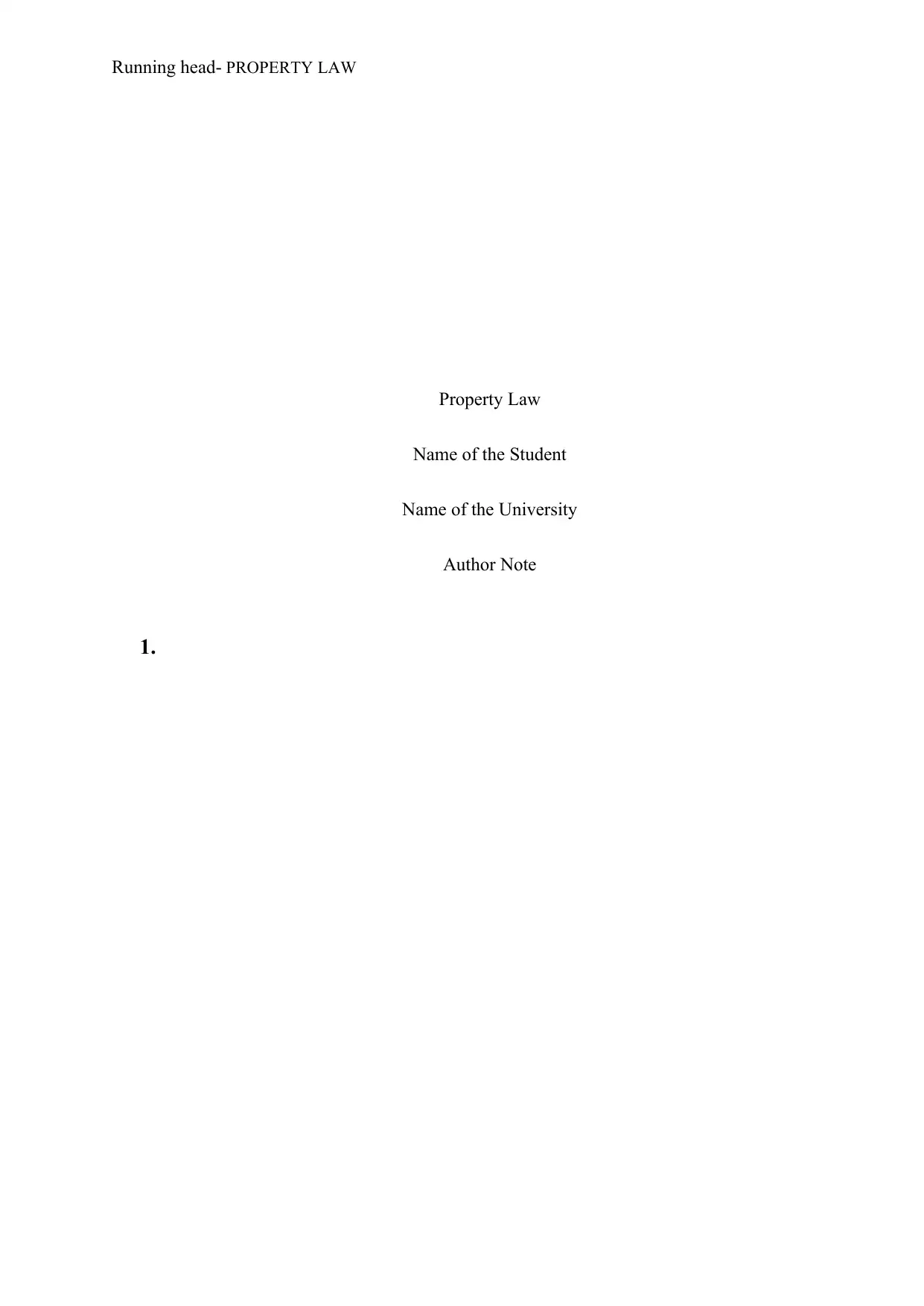
Running head- PROPERTY LAW
Property Law
Name of the Student
Name of the University
Author Note
1.
Property Law
Name of the Student
Name of the University
Author Note
1.
Paraphrase This Document
Need a fresh take? Get an instant paraphrase of this document with our AI Paraphraser
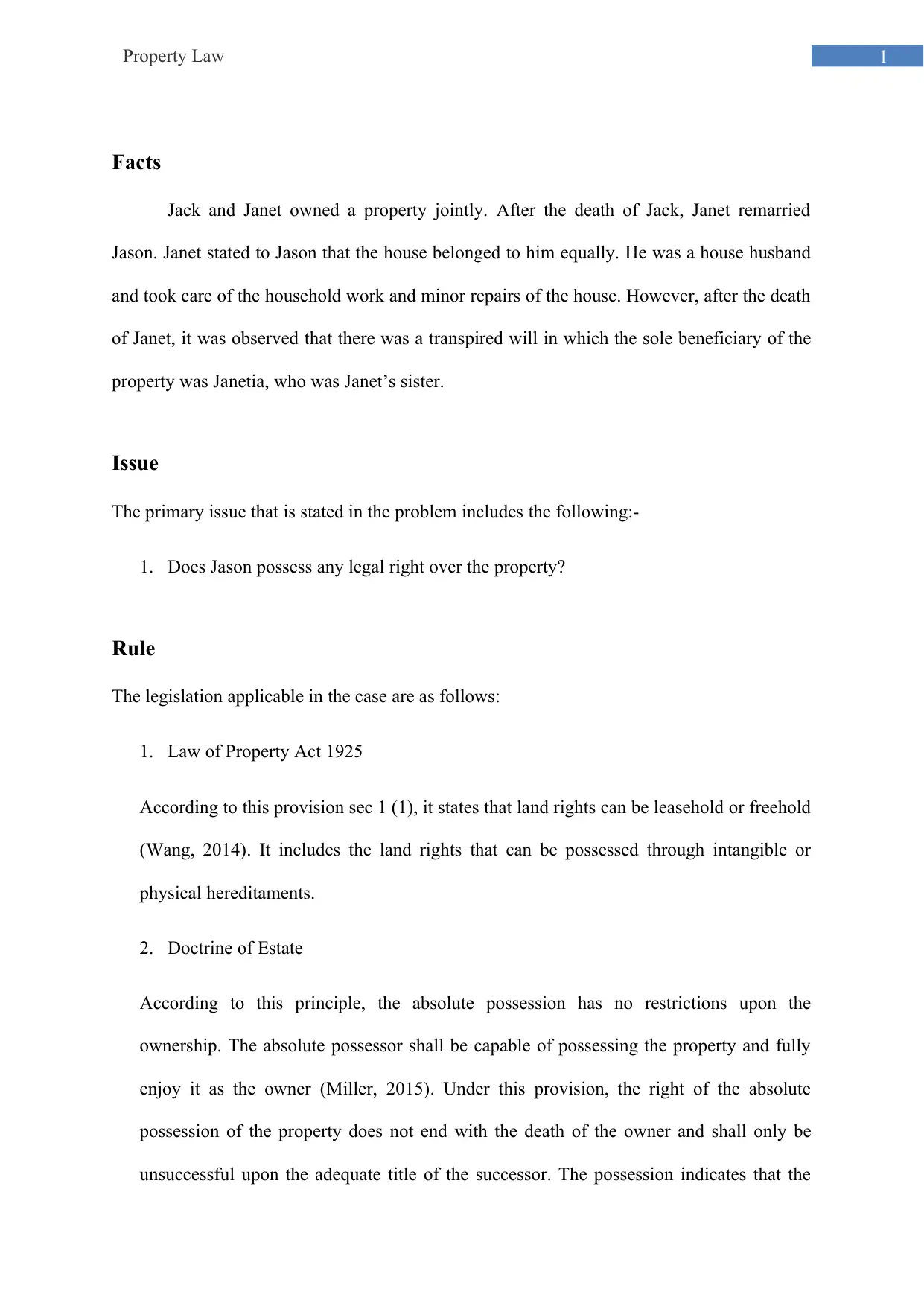
1Property Law
Facts
Jack and Janet owned a property jointly. After the death of Jack, Janet remarried
Jason. Janet stated to Jason that the house belonged to him equally. He was a house husband
and took care of the household work and minor repairs of the house. However, after the death
of Janet, it was observed that there was a transpired will in which the sole beneficiary of the
property was Janetia, who was Janet’s sister.
Issue
The primary issue that is stated in the problem includes the following:-
1. Does Jason possess any legal right over the property?
Rule
The legislation applicable in the case are as follows:
1. Law of Property Act 1925
According to this provision sec 1 (1), it states that land rights can be leasehold or freehold
(Wang, 2014). It includes the land rights that can be possessed through intangible or
physical hereditaments.
2. Doctrine of Estate
According to this principle, the absolute possession has no restrictions upon the
ownership. The absolute possessor shall be capable of possessing the property and fully
enjoy it as the owner (Miller, 2015). Under this provision, the right of the absolute
possession of the property does not end with the death of the owner and shall only be
unsuccessful upon the adequate title of the successor. The possession indicates that the
Facts
Jack and Janet owned a property jointly. After the death of Jack, Janet remarried
Jason. Janet stated to Jason that the house belonged to him equally. He was a house husband
and took care of the household work and minor repairs of the house. However, after the death
of Janet, it was observed that there was a transpired will in which the sole beneficiary of the
property was Janetia, who was Janet’s sister.
Issue
The primary issue that is stated in the problem includes the following:-
1. Does Jason possess any legal right over the property?
Rule
The legislation applicable in the case are as follows:
1. Law of Property Act 1925
According to this provision sec 1 (1), it states that land rights can be leasehold or freehold
(Wang, 2014). It includes the land rights that can be possessed through intangible or
physical hereditaments.
2. Doctrine of Estate
According to this principle, the absolute possession has no restrictions upon the
ownership. The absolute possessor shall be capable of possessing the property and fully
enjoy it as the owner (Miller, 2015). Under this provision, the right of the absolute
possession of the property does not end with the death of the owner and shall only be
unsuccessful upon the adequate title of the successor. The possession indicates that the
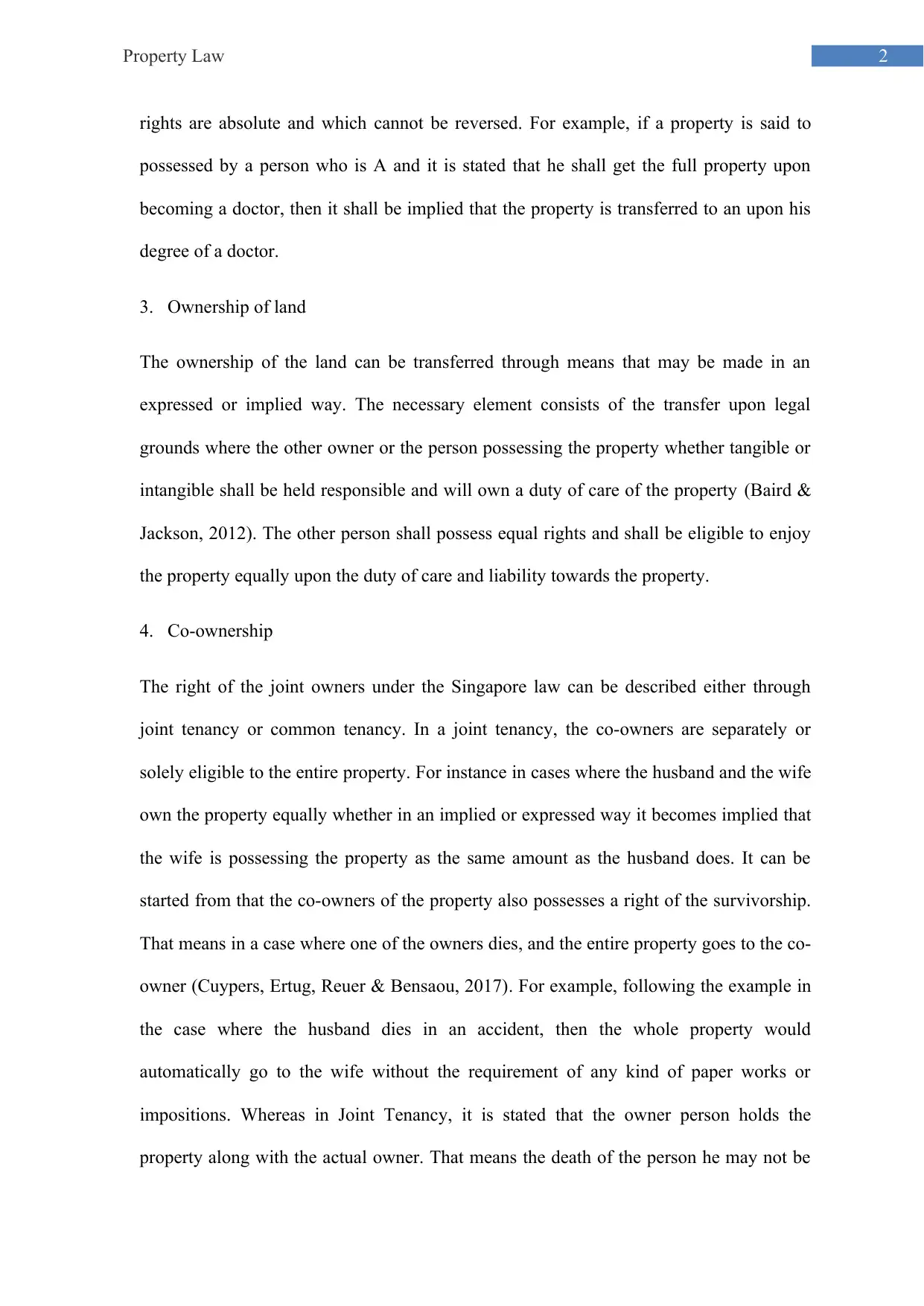
2Property Law
rights are absolute and which cannot be reversed. For example, if a property is said to
possessed by a person who is A and it is stated that he shall get the full property upon
becoming a doctor, then it shall be implied that the property is transferred to an upon his
degree of a doctor.
3. Ownership of land
The ownership of the land can be transferred through means that may be made in an
expressed or implied way. The necessary element consists of the transfer upon legal
grounds where the other owner or the person possessing the property whether tangible or
intangible shall be held responsible and will own a duty of care of the property (Baird &
Jackson, 2012). The other person shall possess equal rights and shall be eligible to enjoy
the property equally upon the duty of care and liability towards the property.
4. Co-ownership
The right of the joint owners under the Singapore law can be described either through
joint tenancy or common tenancy. In a joint tenancy, the co-owners are separately or
solely eligible to the entire property. For instance in cases where the husband and the wife
own the property equally whether in an implied or expressed way it becomes implied that
the wife is possessing the property as the same amount as the husband does. It can be
started from that the co-owners of the property also possesses a right of the survivorship.
That means in a case where one of the owners dies, and the entire property goes to the co-
owner (Cuypers, Ertug, Reuer & Bensaou, 2017). For example, following the example in
the case where the husband dies in an accident, then the whole property would
automatically go to the wife without the requirement of any kind of paper works or
impositions. Whereas in Joint Tenancy, it is stated that the owner person holds the
property along with the actual owner. That means the death of the person he may not be
rights are absolute and which cannot be reversed. For example, if a property is said to
possessed by a person who is A and it is stated that he shall get the full property upon
becoming a doctor, then it shall be implied that the property is transferred to an upon his
degree of a doctor.
3. Ownership of land
The ownership of the land can be transferred through means that may be made in an
expressed or implied way. The necessary element consists of the transfer upon legal
grounds where the other owner or the person possessing the property whether tangible or
intangible shall be held responsible and will own a duty of care of the property (Baird &
Jackson, 2012). The other person shall possess equal rights and shall be eligible to enjoy
the property equally upon the duty of care and liability towards the property.
4. Co-ownership
The right of the joint owners under the Singapore law can be described either through
joint tenancy or common tenancy. In a joint tenancy, the co-owners are separately or
solely eligible to the entire property. For instance in cases where the husband and the wife
own the property equally whether in an implied or expressed way it becomes implied that
the wife is possessing the property as the same amount as the husband does. It can be
started from that the co-owners of the property also possesses a right of the survivorship.
That means in a case where one of the owners dies, and the entire property goes to the co-
owner (Cuypers, Ertug, Reuer & Bensaou, 2017). For example, following the example in
the case where the husband dies in an accident, then the whole property would
automatically go to the wife without the requirement of any kind of paper works or
impositions. Whereas in Joint Tenancy, it is stated that the owner person holds the
property along with the actual owner. That means the death of the person he may not be
⊘ This is a preview!⊘
Do you want full access?
Subscribe today to unlock all pages.

Trusted by 1+ million students worldwide
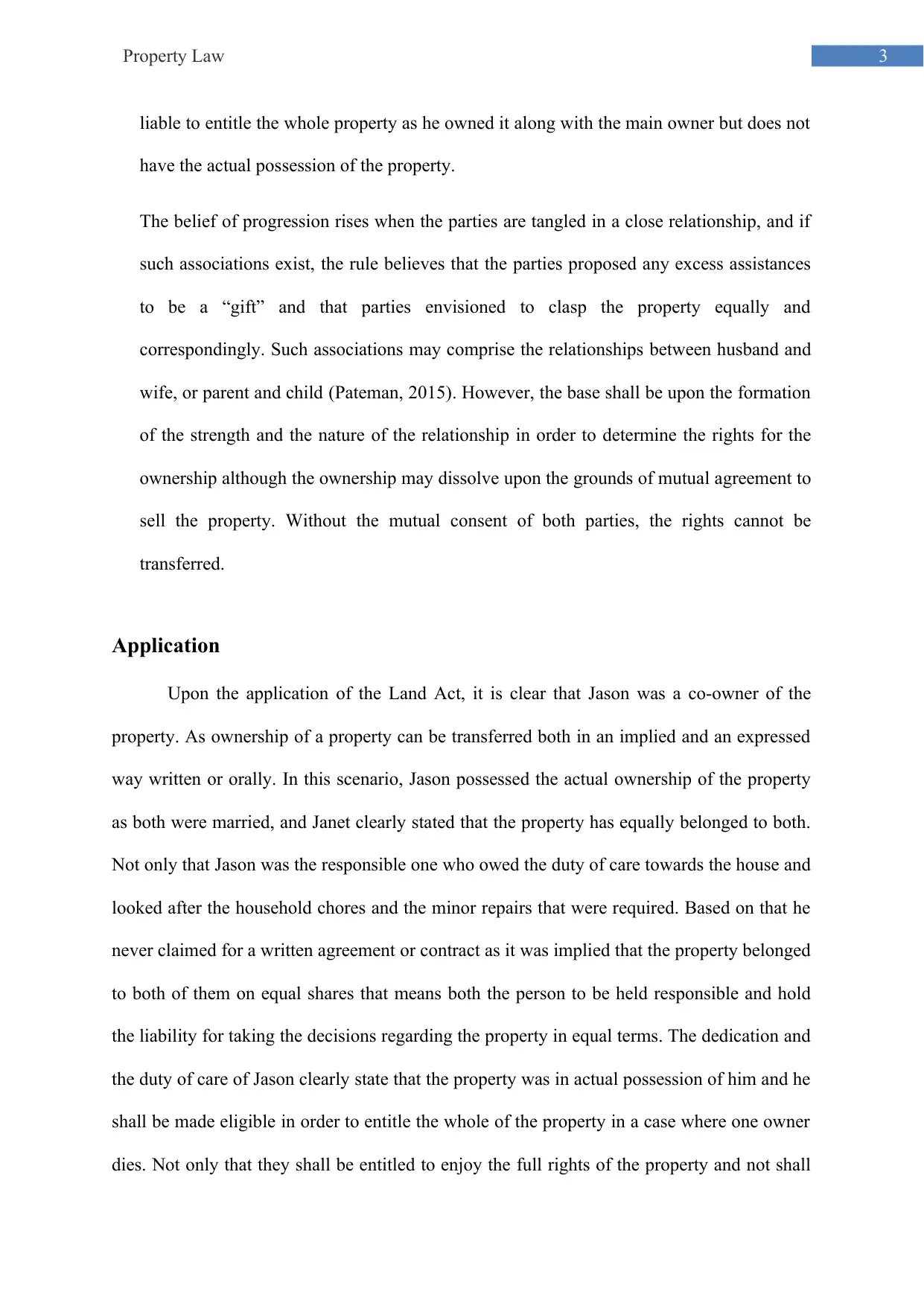
3Property Law
liable to entitle the whole property as he owned it along with the main owner but does not
have the actual possession of the property.
The belief of progression rises when the parties are tangled in a close relationship, and if
such associations exist, the rule believes that the parties proposed any excess assistances
to be a “gift” and that parties envisioned to clasp the property equally and
correspondingly. Such associations may comprise the relationships between husband and
wife, or parent and child (Pateman, 2015). However, the base shall be upon the formation
of the strength and the nature of the relationship in order to determine the rights for the
ownership although the ownership may dissolve upon the grounds of mutual agreement to
sell the property. Without the mutual consent of both parties, the rights cannot be
transferred.
Application
Upon the application of the Land Act, it is clear that Jason was a co-owner of the
property. As ownership of a property can be transferred both in an implied and an expressed
way written or orally. In this scenario, Jason possessed the actual ownership of the property
as both were married, and Janet clearly stated that the property has equally belonged to both.
Not only that Jason was the responsible one who owed the duty of care towards the house and
looked after the household chores and the minor repairs that were required. Based on that he
never claimed for a written agreement or contract as it was implied that the property belonged
to both of them on equal shares that means both the person to be held responsible and hold
the liability for taking the decisions regarding the property in equal terms. The dedication and
the duty of care of Jason clearly state that the property was in actual possession of him and he
shall be made eligible in order to entitle the whole of the property in a case where one owner
dies. Not only that they shall be entitled to enjoy the full rights of the property and not shall
liable to entitle the whole property as he owned it along with the main owner but does not
have the actual possession of the property.
The belief of progression rises when the parties are tangled in a close relationship, and if
such associations exist, the rule believes that the parties proposed any excess assistances
to be a “gift” and that parties envisioned to clasp the property equally and
correspondingly. Such associations may comprise the relationships between husband and
wife, or parent and child (Pateman, 2015). However, the base shall be upon the formation
of the strength and the nature of the relationship in order to determine the rights for the
ownership although the ownership may dissolve upon the grounds of mutual agreement to
sell the property. Without the mutual consent of both parties, the rights cannot be
transferred.
Application
Upon the application of the Land Act, it is clear that Jason was a co-owner of the
property. As ownership of a property can be transferred both in an implied and an expressed
way written or orally. In this scenario, Jason possessed the actual ownership of the property
as both were married, and Janet clearly stated that the property has equally belonged to both.
Not only that Jason was the responsible one who owed the duty of care towards the house and
looked after the household chores and the minor repairs that were required. Based on that he
never claimed for a written agreement or contract as it was implied that the property belonged
to both of them on equal shares that means both the person to be held responsible and hold
the liability for taking the decisions regarding the property in equal terms. The dedication and
the duty of care of Jason clearly state that the property was in actual possession of him and he
shall be made eligible in order to entitle the whole of the property in a case where one owner
dies. Not only that they shall be entitled to enjoy the full rights of the property and not shall
Paraphrase This Document
Need a fresh take? Get an instant paraphrase of this document with our AI Paraphraser
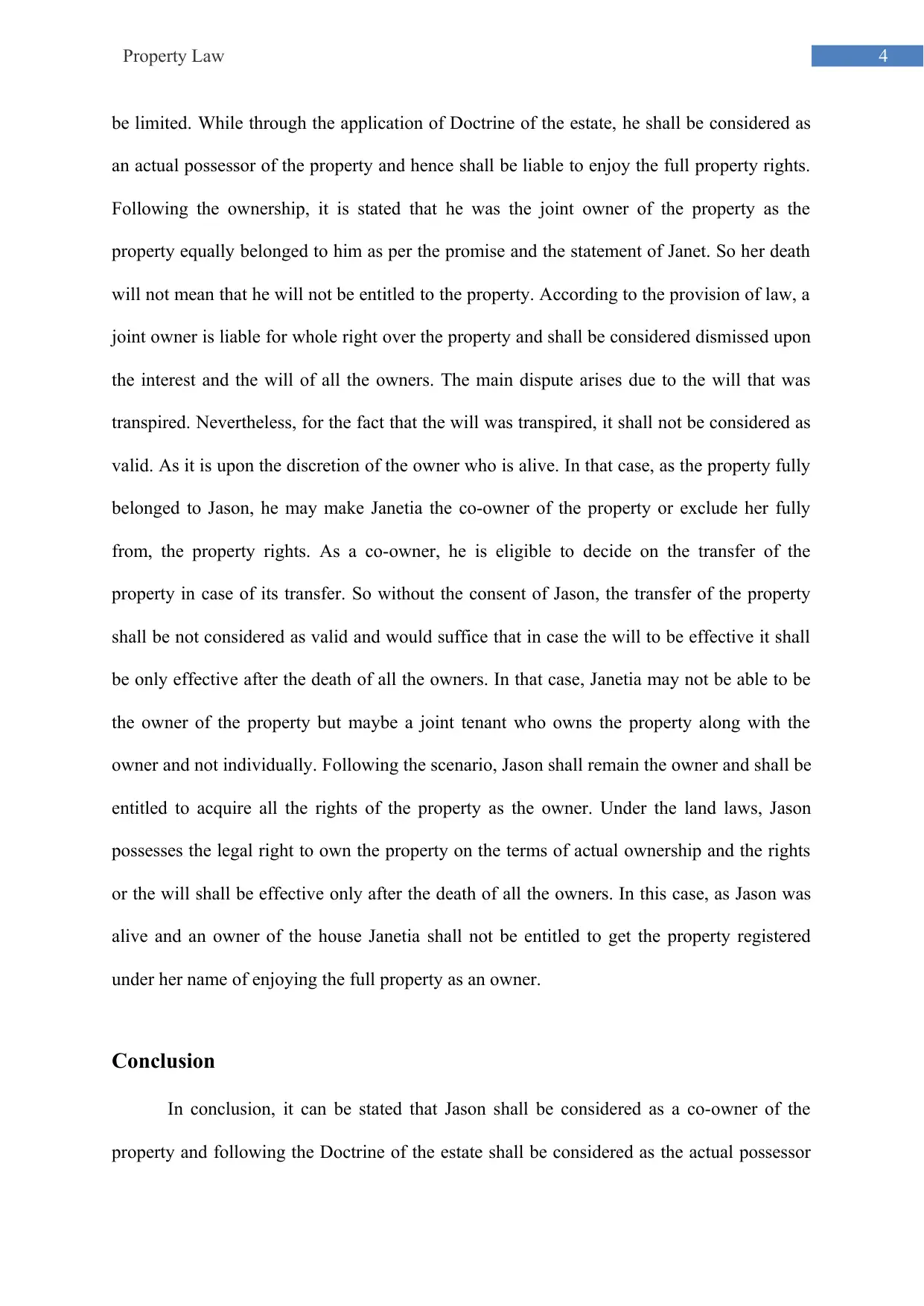
4Property Law
be limited. While through the application of Doctrine of the estate, he shall be considered as
an actual possessor of the property and hence shall be liable to enjoy the full property rights.
Following the ownership, it is stated that he was the joint owner of the property as the
property equally belonged to him as per the promise and the statement of Janet. So her death
will not mean that he will not be entitled to the property. According to the provision of law, a
joint owner is liable for whole right over the property and shall be considered dismissed upon
the interest and the will of all the owners. The main dispute arises due to the will that was
transpired. Nevertheless, for the fact that the will was transpired, it shall not be considered as
valid. As it is upon the discretion of the owner who is alive. In that case, as the property fully
belonged to Jason, he may make Janetia the co-owner of the property or exclude her fully
from, the property rights. As a co-owner, he is eligible to decide on the transfer of the
property in case of its transfer. So without the consent of Jason, the transfer of the property
shall be not considered as valid and would suffice that in case the will to be effective it shall
be only effective after the death of all the owners. In that case, Janetia may not be able to be
the owner of the property but maybe a joint tenant who owns the property along with the
owner and not individually. Following the scenario, Jason shall remain the owner and shall be
entitled to acquire all the rights of the property as the owner. Under the land laws, Jason
possesses the legal right to own the property on the terms of actual ownership and the rights
or the will shall be effective only after the death of all the owners. In this case, as Jason was
alive and an owner of the house Janetia shall not be entitled to get the property registered
under her name of enjoying the full property as an owner.
Conclusion
In conclusion, it can be stated that Jason shall be considered as a co-owner of the
property and following the Doctrine of the estate shall be considered as the actual possessor
be limited. While through the application of Doctrine of the estate, he shall be considered as
an actual possessor of the property and hence shall be liable to enjoy the full property rights.
Following the ownership, it is stated that he was the joint owner of the property as the
property equally belonged to him as per the promise and the statement of Janet. So her death
will not mean that he will not be entitled to the property. According to the provision of law, a
joint owner is liable for whole right over the property and shall be considered dismissed upon
the interest and the will of all the owners. The main dispute arises due to the will that was
transpired. Nevertheless, for the fact that the will was transpired, it shall not be considered as
valid. As it is upon the discretion of the owner who is alive. In that case, as the property fully
belonged to Jason, he may make Janetia the co-owner of the property or exclude her fully
from, the property rights. As a co-owner, he is eligible to decide on the transfer of the
property in case of its transfer. So without the consent of Jason, the transfer of the property
shall be not considered as valid and would suffice that in case the will to be effective it shall
be only effective after the death of all the owners. In that case, Janetia may not be able to be
the owner of the property but maybe a joint tenant who owns the property along with the
owner and not individually. Following the scenario, Jason shall remain the owner and shall be
entitled to acquire all the rights of the property as the owner. Under the land laws, Jason
possesses the legal right to own the property on the terms of actual ownership and the rights
or the will shall be effective only after the death of all the owners. In this case, as Jason was
alive and an owner of the house Janetia shall not be entitled to get the property registered
under her name of enjoying the full property as an owner.
Conclusion
In conclusion, it can be stated that Jason shall be considered as a co-owner of the
property and following the Doctrine of the estate shall be considered as the actual possessor
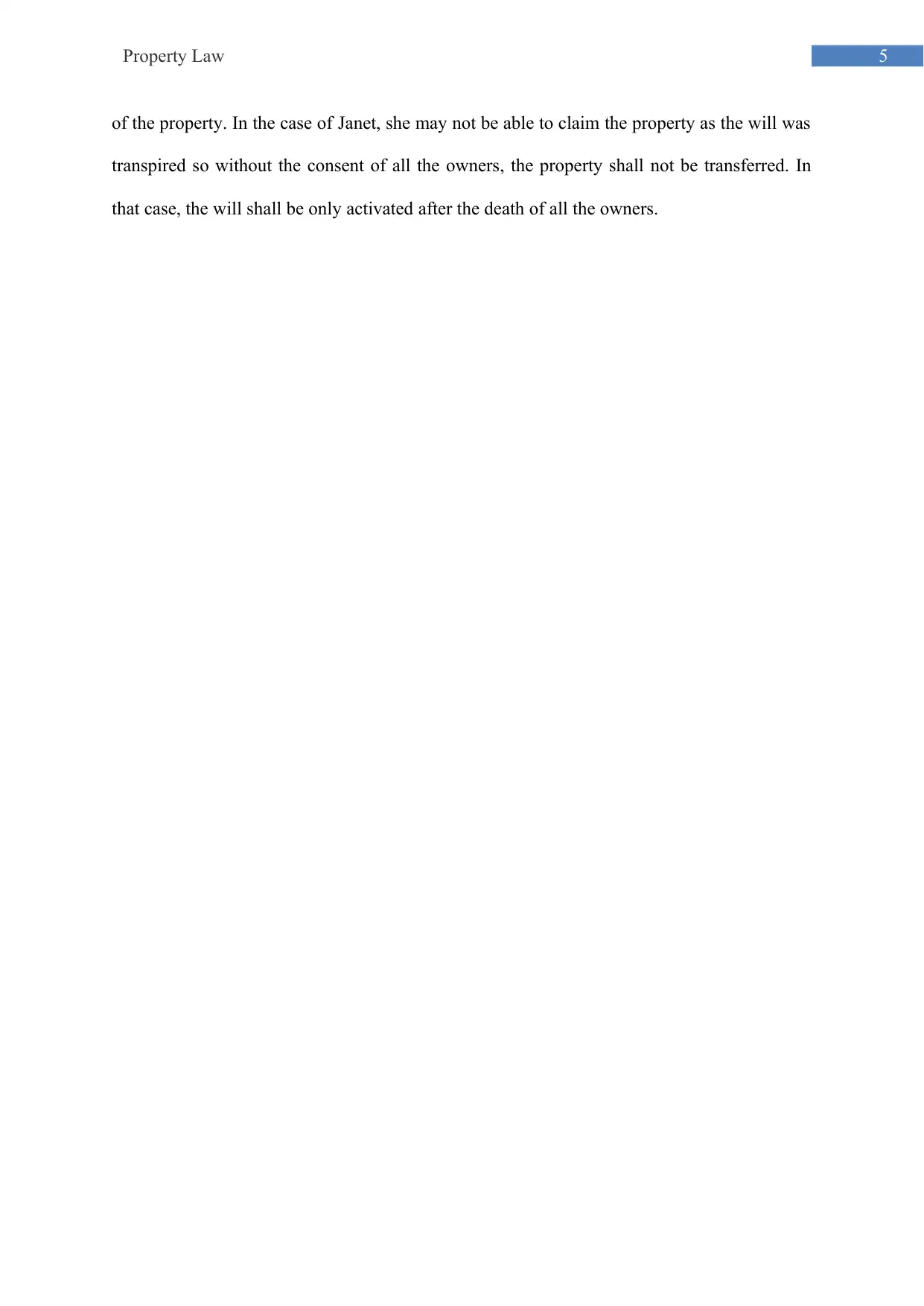
5Property Law
of the property. In the case of Janet, she may not be able to claim the property as the will was
transpired so without the consent of all the owners, the property shall not be transferred. In
that case, the will shall be only activated after the death of all the owners.
of the property. In the case of Janet, she may not be able to claim the property as the will was
transpired so without the consent of all the owners, the property shall not be transferred. In
that case, the will shall be only activated after the death of all the owners.
⊘ This is a preview!⊘
Do you want full access?
Subscribe today to unlock all pages.

Trusted by 1+ million students worldwide
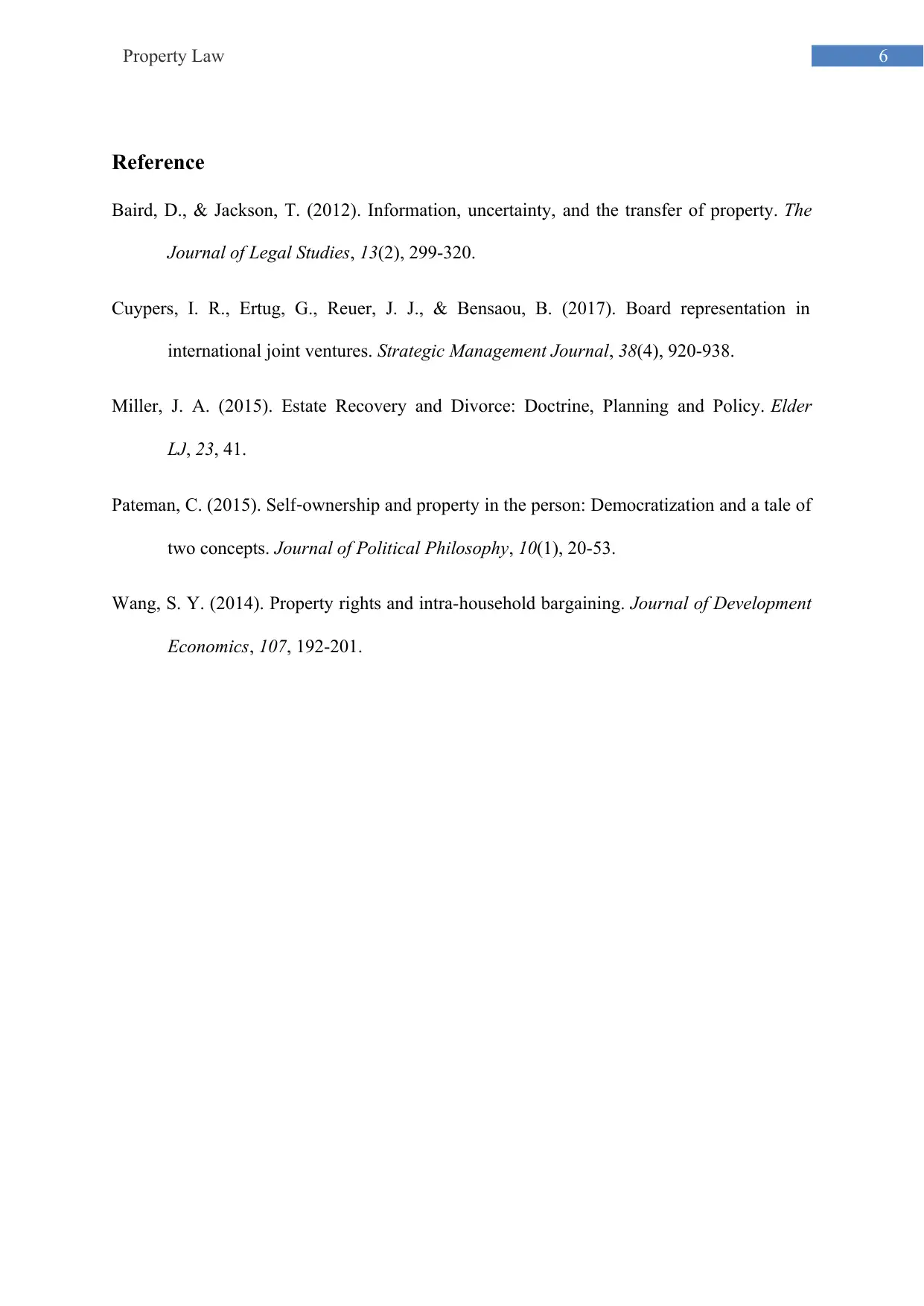
6Property Law
Reference
Baird, D., & Jackson, T. (2012). Information, uncertainty, and the transfer of property. The
Journal of Legal Studies, 13(2), 299-320.
Cuypers, I. R., Ertug, G., Reuer, J. J., & Bensaou, B. (2017). Board representation in
international joint ventures. Strategic Management Journal, 38(4), 920-938.
Miller, J. A. (2015). Estate Recovery and Divorce: Doctrine, Planning and Policy. Elder
LJ, 23, 41.
Pateman, C. (2015). Self‐ownership and property in the person: Democratization and a tale of
two concepts. Journal of Political Philosophy, 10(1), 20-53.
Wang, S. Y. (2014). Property rights and intra-household bargaining. Journal of Development
Economics, 107, 192-201.
Reference
Baird, D., & Jackson, T. (2012). Information, uncertainty, and the transfer of property. The
Journal of Legal Studies, 13(2), 299-320.
Cuypers, I. R., Ertug, G., Reuer, J. J., & Bensaou, B. (2017). Board representation in
international joint ventures. Strategic Management Journal, 38(4), 920-938.
Miller, J. A. (2015). Estate Recovery and Divorce: Doctrine, Planning and Policy. Elder
LJ, 23, 41.
Pateman, C. (2015). Self‐ownership and property in the person: Democratization and a tale of
two concepts. Journal of Political Philosophy, 10(1), 20-53.
Wang, S. Y. (2014). Property rights and intra-household bargaining. Journal of Development
Economics, 107, 192-201.
1 out of 7
Related Documents
Your All-in-One AI-Powered Toolkit for Academic Success.
+13062052269
info@desklib.com
Available 24*7 on WhatsApp / Email
![[object Object]](/_next/static/media/star-bottom.7253800d.svg)
Unlock your academic potential
Copyright © 2020–2026 A2Z Services. All Rights Reserved. Developed and managed by ZUCOL.





